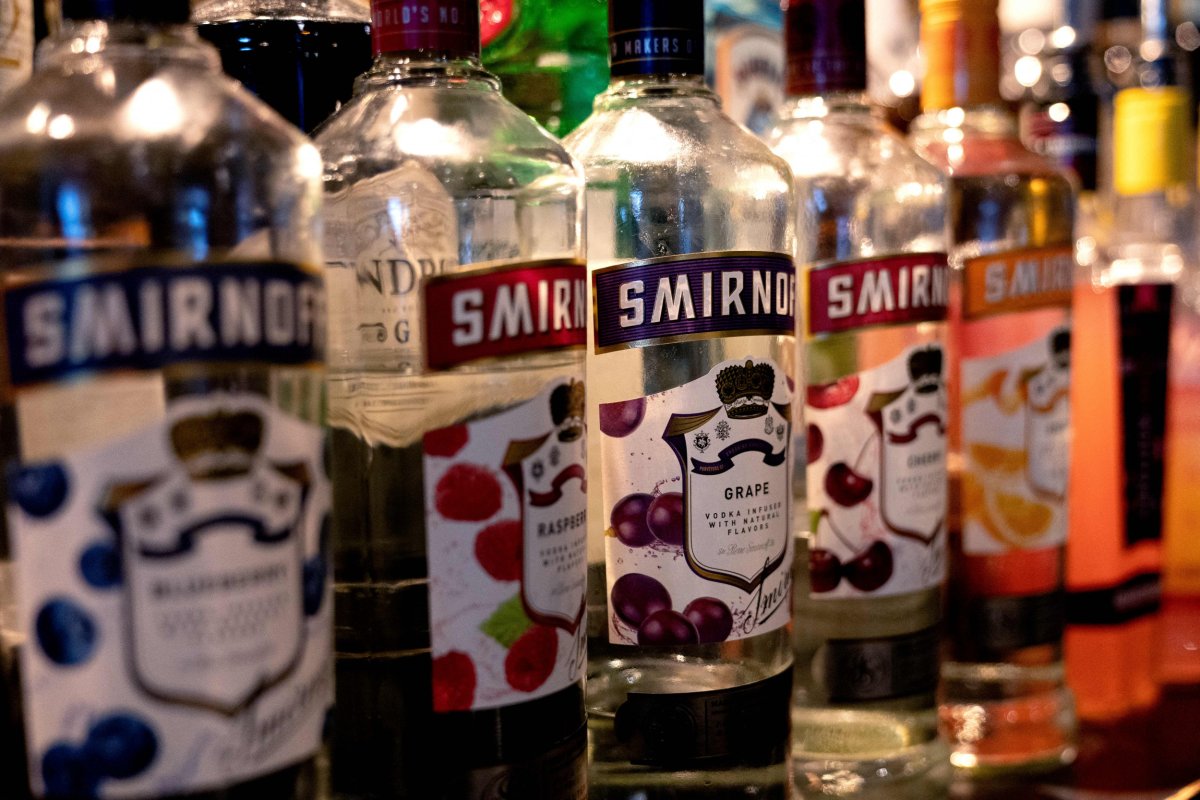Some vodka brands are fighting to remind consumers they are not Russian-made as several states ban the sale of Russian vodka over its invasion of Ukraine.
Several states have moved to ban the sale of Russian vodka—the liquor most associated with Russia—while other businesses and consumers have pledged to boycott the product due to the invasion.
But some non-Russian brands are working to further distance themselves from Russia amid confusion about which vodka brands are actually made in Russia.
Stoli vodka, which was originally founded in the Soviet Union but is no longer produced in Russia; instead, it is made in Latvia, a former Soviet state. The brand denounced the invasion in a statement placed on their website's homepage.
"Stoli Group has had a long history of fighting oppression from the Russian regime. We unequivocally condemn the military action in Ukraine and stand in support of the Ukrainian people," the statement said.
The vodka's founder, Yuri Shefler, noted that he has "personally experienced persecution by Russian authorities" after Russia's Supreme Court banned the sale of the vodka in 2001.
"I share the pain of Ukraine and its people," he wrote.
Still, the vodka will not be sold in state-run liquor stores in New Hampshire, E.J. Powers, a spokesperson for the New Hampshire Liquor Commission.
"Products that use the words 'Russia' or 'Russian' in the brand name, advertising, or product description—along with products that depict Russian architecture or symbols colloquially associated with Russia—are all considered to be Russian-branded products and have been removed under the Governor's Executive Order," Powers wrote.
Meanwhile, Smirnoff touted their American-made credentials on their homepage. The brand was originally founded in a distillery in Moscow in 1864 but is no longer made in Russia. It is owned and operated by British company Diageo and distilled in Illinois. Smirnoff was previously made in Connecticut, beginning in Bethel during the Great Depression and later moved to Hartford, according to a report from Connecticut Insider.
New Hampshire's ban does not include Smirnoff, according to a list of affected brands sent by Powers.
"While Smirnoff had its beginnings in Russia, Vladimir Smirnoff fled the country during the Revolution and re-established the brand in Europe more than a century ago," the homepage reads.
Few popular vodka companies, in fact, will be impacted by the bans. According to data from Beverage Dynamics, the other leading brands of vodka in the U.S. including Tito's Handmade Vodka and New Amsterdam are not made in Russia.
The states that have so far instituted a ban on Russian vodka sales include Iowa, New Hampshire, Ohio, Oregon, Pennsylvania, Utah, Virginia and West Virginia.
Experts, however, warn the bans may not have a huge impact on Russian business.
"Many vodka brands that trace their origin to Russia are actually no longer produced in Russia, so boycotts of those brands do very little to impact Russian businesses," Brandy Rand, COO of the Americas at IWSR Drinks Market Analysis wrote in a statement to Newsweek. "In 2020, less than 1% of vodka volume in the US was from brands produced in Russia."
In fact, more than 90 percent of vodka consumed in the United States is also produced in the U.S. Globally, only about 14 percent of vodka is produced in Russia—with 13 percent of that being sold in the country, according to the statement.
The Pennsylvania Liquor Board, in a statement sent to Newsweek, wrote: "Although some producers give their vodkas Russian-themed monikers and marketing because many consumers often associate vodka with Russia, few products carried by Fine Wine & Good Spirits are actually sourced from Russia."
The only two brands sold in Pennsylvania Liquor Board stores are Russian Standard and Ustianochka 80-proof vodkas, according to the statement. Russian-made vodkas that have been pulled from shelves in other states include Hammer & Sickle, ZYR, Mamont, Beluga, Imperia, Organika, Quadro, Green Mark, and Jewel of Russia.
Other countries, including Canada and Finland, have also moved to stop selling Russian vodka.
Newsweek reached out to Stoli for further comment Tuesday morning. This story will be updated with any response.
Update 03/01/2022 1:30 p.m. ET: This article was updated with a statement from New Hampshire Liquor Commission and more information about Smirnoff.
Update 03/01/2022 2:45 p.m. ET: This article was updated with a statement from IWSR Drinks Market Analysis.

Uncommon Knowledge
Newsweek is committed to challenging conventional wisdom and finding connections in the search for common ground.
Newsweek is committed to challenging conventional wisdom and finding connections in the search for common ground.
About the writer
Andrew Stanton is a Newsweek weekend reporter based in Maine. His role is reporting on U.S. politics and social issues. ... Read more





